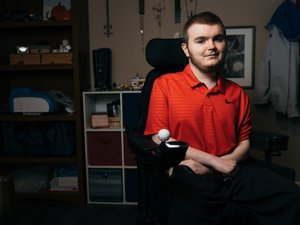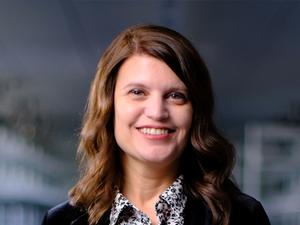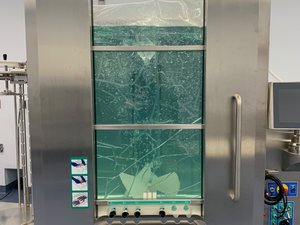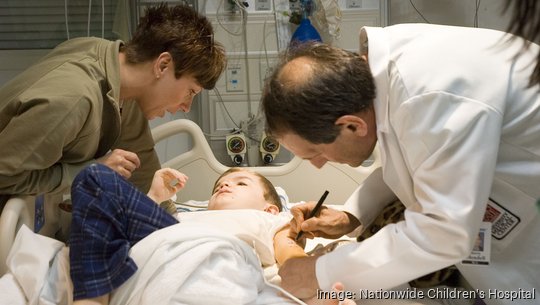
The timing was a coincidence, but the path was deliberate.
On the day the FDA approved the first-ever gene therapy for his form of muscular dystrophy, Andrew Kilbarger was surrounded by balloons and a marching band at the ribbon-cutting of Andelyn Biosciences Inc., the Columbus biotech manufacturer named partly for him because of his participation in the research that made the therapy possible.
At the same time in Grove City, a quarterly networking event was hosted at another biotech manufacturer, Forge Biologics Inc., co-founded by some of those who worked on that therapy in its early stages at Nationwide Children's Hospital.
Already gathered, both groups had another reason to celebrate with the U.S. Food and Drug Administration announcement. Teams who helped develop gene therapies while at Children's now are dispersed among several companies in a blossoming Central Ohio biotech industry, including Andelyn and Forge.
"There are only four products approved in the gene therapy space," Forge co-founder and COO Jaysson Eicholtz said. "Two of them came from Columbus."
Sarepta Therapeutics Inc. received limited approval for the treatment for Duchenne muscular dystrophy, a common and deadly variation of the degenerative condition. The Boston-area biotech licenses the technology from the Columbus hospital, hired the co-inventor from Children's and established its main R&D lab in the Easton area.
"It's a good day for the hospital – and the region," said Dr. Dennis Durbin, president of the hospital's Wexner Research Institute, at the Andelyn celebration.
"We have the infrastructure to continue to advance great cures," said CEO Tim Robinson, standing next to Durbin. Expect more therapies, licenses like Sarepta's and spinoffs to come, he said.
"We're really starting to shift the center of the universe for gene therapy here," he said.
Children's spun out Andelyn in late 2019 and owns 51%. Limited production started in the fall at its commercial-scale facility for manufacturing the genetic materials and modified viruses used in gene and cell therapies. The office portion opened this spring and construction is nearly complete on the rest of the production side.
It's the first private company to locate in Ohio State University's Carmenton innovation district.
"The leadership at Children's has had the vision and the confidence to continue to invest in that innovation pipeline," said Eddie Pauline, CEO of the trade group Ohio Life Sciences. "We're now starting to see why that's so important. The 'incurable' is now being cured because of investments that hospital made."
Sarepta choosing Columbus for its research center is "a huge statement about our capabilities and expertise," Pauline said.
Kilbarger – the "And" in Andelyn – attended the ribbon-cutting with his parents and siblings. The "elyn" in the company name honors Evelyn Villareal, who as an infant received the first treatment for fatal spinal muscular atrophy, which became the hospital's first FDA-approved gene therapy. She has grown nearly symptom-free. The family lives out of state and was not able to attend.
"Andrew and his family are true pioneers who embody the extraordinary hope patients put in research ... to push the boundaries of biotechnology," Durbin said.
At age 8 in 2006, Kilbarger, who has Duchenne, became the first human to test the safety of injecting a corrected segment of the Duchenne gene. The Lancaster resident was a patient of Dr. Jerry Mendell at Children's, who invented the therapy with Louise Rodino-Klapac, then at the hospital and now Sarepta's executive vice president and research chief.
"Because of that, they made more therapies," he said at the Andelyn event. "It so happened I was the one to do it."
The test was only for a small patch on one arm. He cannot benefit from the treatment that resulted, for now allowed for use only in 4- and 5-year olds who can still walk. He is 26, well past the age of death for most with the condition, which predominantly affects males.
Kilbarger's condition has been managed medically and through a strict diet; he has some use of his arms and hands and can breathe on his own. No treatment would bring back the muscles he's already lost.
"Who knows?" he said at the event. "If they could stop it right now – there's no telling what science can do anymore."
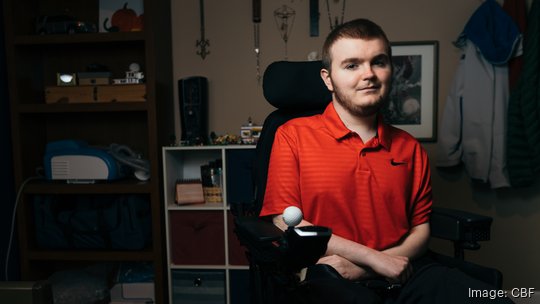
Children's invested in the equipment to make the biological material for gene therapy research, in-house manufacturing that eventually grew into the Andelyn spinoff. Andelyn's employees worked on the Duchenne project when they were still in the hospital.
Other veterans of the project now are with companies including Forge.
"I made that product," Eicholtz said. "There are a lot of people working at Forge who were working at Nationwide when that program came through. It's just fantastic news.
"The more (approvals) move forward, the more it validates gene therapy and the more it validates the work we do."
Founded in 2020, Forge opened an expansion this spring to its nearly 230,000-square-foot facility. Besides manufacturing, the startup is developing proprietary therapies, including one being tested in infants with Krabbe disease, which is usually fatal by age 2. The company hosted the quarterly TechStrategy event that rotates among various Central Ohio technology companies.
Ostensibly, Andelyn and Forge are competitors. But besides being staffed with former co-workers, they both have huge demand because there's such a shortage of manufacturing capacity industrywide. A different company manufactures the Duchenne therapy for Sarepta.
"Everyone makes everyone else better," Eicholtz said. "I want their facility to be full, with plenty of products on the floor, just like I want my facility to be full – because it's good for gene therapy."
